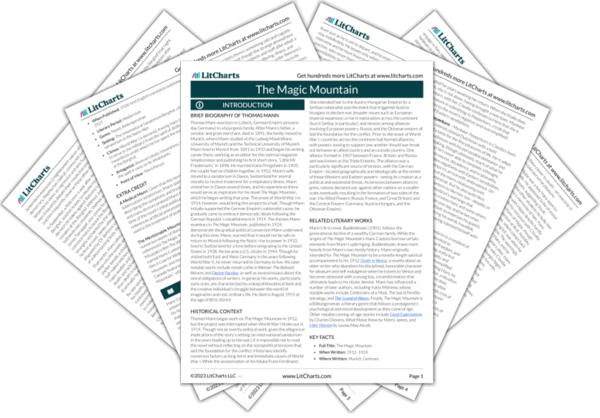Throughout The Magic Mountain, the novel’s omniscient narrator makes abundant, explicit references to time, focusing on time’s subjectivity in particular. The novel opens with the arrival of its protagonist, Hans Castorp, at the Berghof, a sanatorium located in the Swiss Alps, where he’s traveled to visit his cousin Joachim, who is ill with tuberculosis. Though initially Hans only plans to stay at the Berghof for three weeks, he falls ill just before he’s scheduled to depart and ultimately remains at the sanatorium for seven years. While one might expect each of the novel’s seven chapters to cover one year of Hans’s stay at the Berghof, this is not the case; indeed, Hans’s first three weeks at the sanatorium drag on well into Chapter 5. In these first several chapters, the narration describes Hans’s complicated process of getting “acclimatized” to the Berghof’s strange and unfamiliar way of life in hilariously excessive detail, as when the narrator describes Hans’s learning, step by step, the complicated process by which all the Berghof’s residents wrap themselves in camel-hair blankets to keep warm in colder weather. However, once Hans’s initial three weeks are up and he accepts that he is now a permanent resident of the Berghof rather than a temporary visitor, the narrative’s pace accelerates rapidly, and stretches of months and years go by swiftly and unceremoniously. At the same time, experiences that affect Hans profoundly, such as his romantic tryst with Clavdia Chauchat or his impassioned research of various scientific subjects, disproportionately take up many pages. The novel’s examination of time plays out in its plot, too, with Hans often philosophizing about the nature of time.
In both its plot and its structure, The Magic Mountain portrays time as something irregular and unpredictable—and, above all, something that is experienced in subjective and strange ways. It also shows how one’s retrospective sense of time is often quite different from one’s lived experience of time. This is why the narrator, who tells Hans Castorp’s story after it has unfolded, knows which moments will affect Hans profoundly (and therefore which ones should take up a considerable amount of the story’s “time”) and which moments are inconsequential. Finally, in highlighting the subjective nature of time, which plays an essential role in a person’s efforts to make sense of their own life and of history, the novel ultimately makes the overarching point that human experience in general is shaped by undependable, tenuous, and highly mutable thought processes.
Time ThemeTracker

Time Quotes in The Magic Mountain
Time, they say, is water from the river Lethe, but alien air is a similar drink; and if its effects are less profound, it works all the more quickly.
“Quickly and slowly, just as you like,” Joachim replied. “What I’m trying to say is that it doesn’t really pass at all, there is no time as such, and this is no life—no, that it’s not,” he said, shaking his head and reaching again for his glass.
“You said ‘actually.’ But ‘actually’ doesn’t apply,” Hans Castorp responded. He was sitting with one thigh hiked up on the railing; the whites of his eyes were bloodshot. “There is nothing ‘actual’ about time. If it seems long to you, then it is long, and if it seems to pass quickly, then it’s short. But how long or how short it is in actuality, no one knows.” He was not at all used to philosophizing, and yet felt some urge to do so.
Joachim contested this. “Why is that? No. We do measure it. We have clocks and calendars, and when a month has passed, then it’s passed—for you and me and everyone.”
















